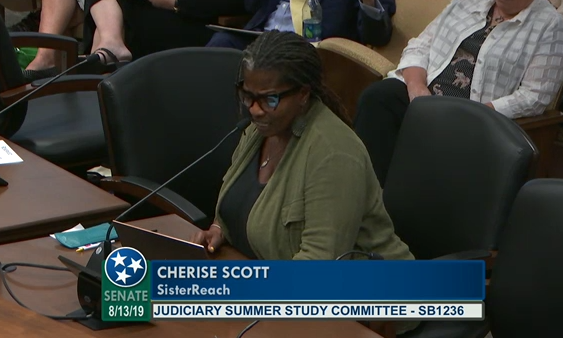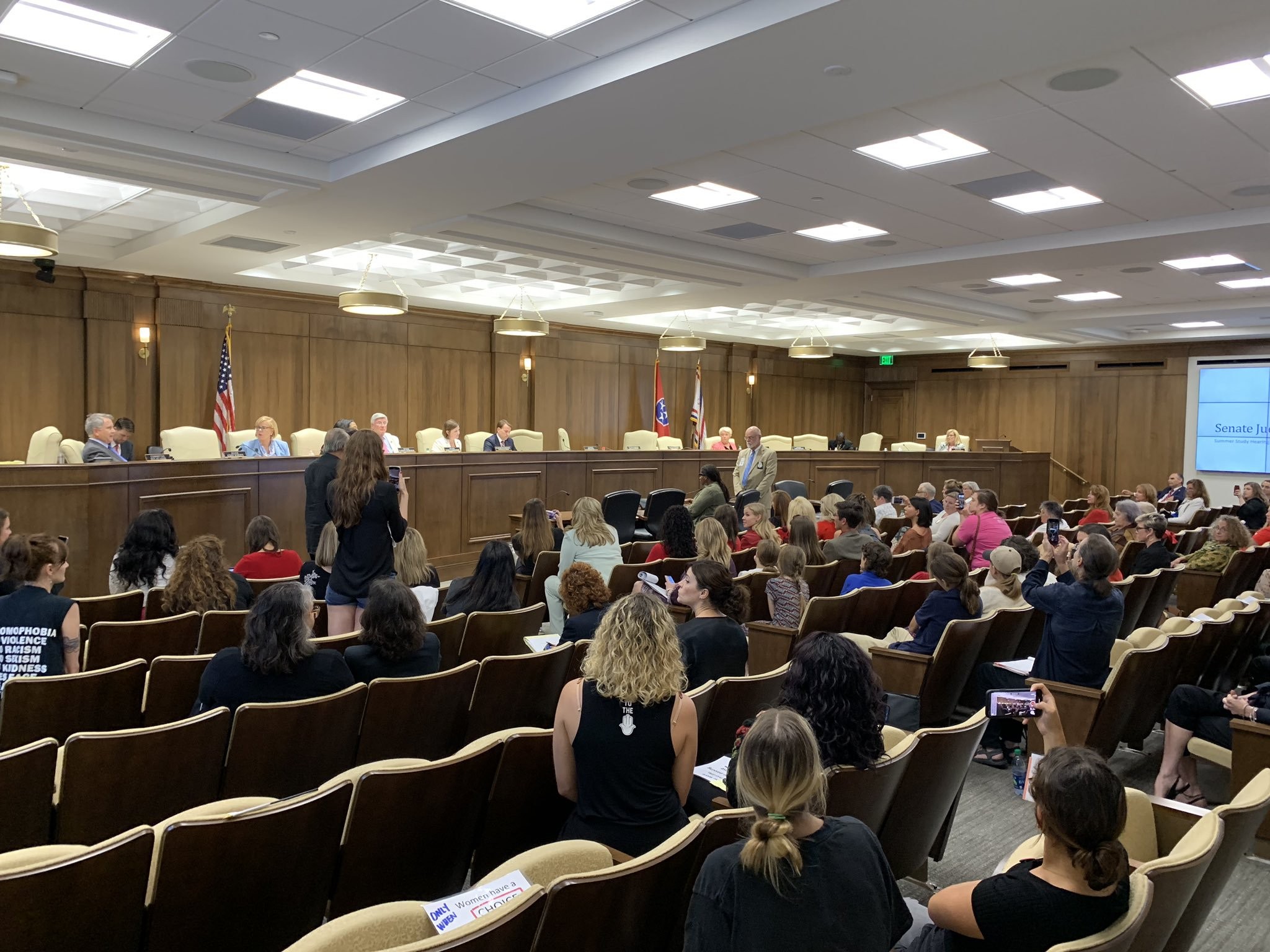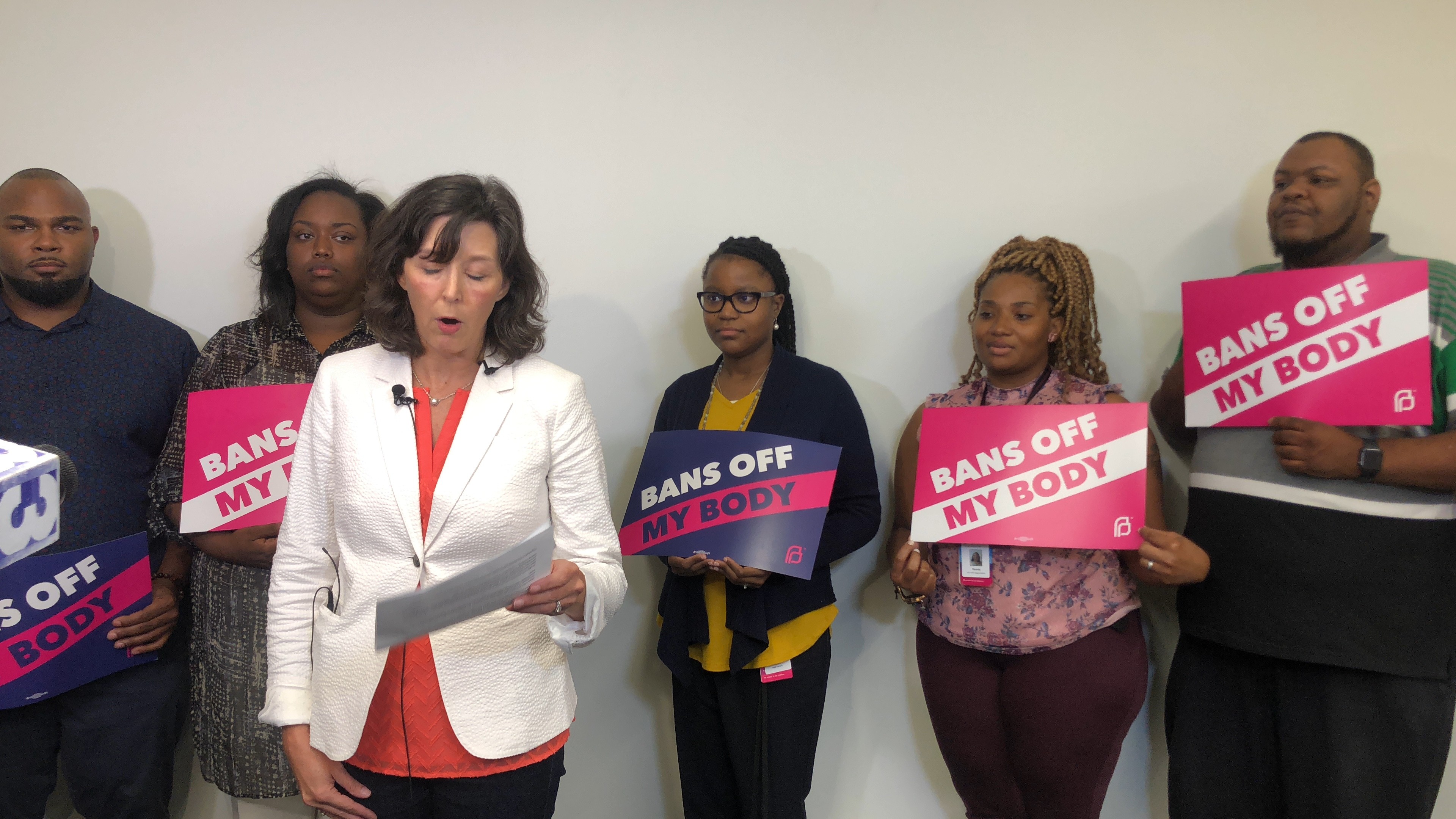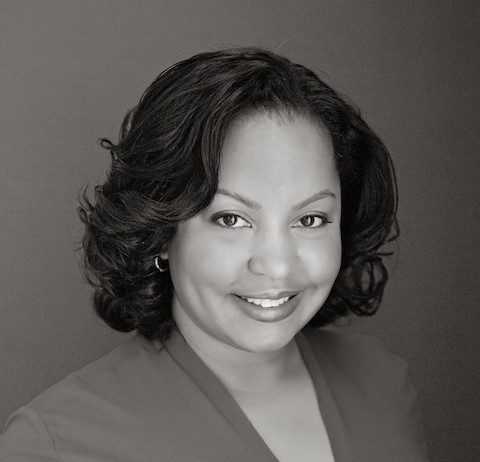
Cherisse Scott
Head of a Memphis organization that works for reproductive justice was cut short during her testimony before the Senate Judiciary Committee Tuesday as she spoke against legislation that would essentially ban abortion in Tennessee.
Cherisse Scott, founder and CEO of SisterReach, an organization meant to help women and girls of color, women living in low-income and rural areas, and the LBGTQ community obtain reproductive justice, was cut off five minutes into what was meant to be a 10-minute testimony by chairman of the committee Senator Mike Bell (R-Riceville).
“Reproductive justice seeks to liberate and emancipate vulnerable populations from all forums of reproductive and sexual oppression,” Scott said early in her testimony. “It challenges us to expand our analysis beyond abortion to be inclusive of the myriad of other issues that preclude women and people that give birth from achieving reproductive and sexual autonomy.”
Scott called the legislation in question an “outright and intentional abandonment by the Tennessee state legislator of these vulnerable people.”
She said the legislation would be the “final straw in a political pattern of vile, racist, un-American, and un-Christian legislation.”
[pullquote-1]
Scott continued citing “harmful” policy making that intersects with abortion rights. She noted the need for sexual education in schools, access to health care, education reform, and more behavioral and mental health care.
She said the legislators have “created an environment that leads Tennesseans to need more abortions, under-care or neglect their children, regardless of whether or not they want to or able to parent.
“And if all this isn’t heartbreaking enough, you weild your political power in Jesus’ name,” Scott said. “Many of you who claim to be conservative Christians have weaponized the word of God to forward your political agendas and maintain power and control over the most vulnerable Tennesseans. You manipulated Biblical scripture to align with your colonialism and supremacist ideologies, instead of showing mercy.”
 Matt Anderson
Matt Anderson
Cherisse Scott continues to speak as she is approached by the sergeant-in-arms
This is when Bell interrupted Scott: “That’s enough. Your time is up.”
Scott continued to speak though, prompting Bell to call for the sergeant-in-arms to escort Scott from the room.
“I have sat here and I have watched you all to allow people to talk and talk, but you won’t allow me to talk as a Christian because I disagree with the way that you believe?” Scott said, noting that she hadn’t gone over her allotted 10 minutes.
Bell asked for Scott’s microphone to be turned off, as she continued to speak, and then he called for a five-minute recess, and left the room.
“Either you care about people’s bodies or you do not,” Scott told the committee. “Either you are here to save my life or you are not. Stop being an impostor of God’s word and do your jobs.”
Scott’s words garnered applause and cheers from members of the audience. Watch Scott’s interrupted testimony here or read the entire testimony here.
Of the 21 witnesses that spoke before the committee, Scott was the only one prohibited from completing her testimony. She was also the only African-American witness, and one of nine women.
SisterReach called the committee’s actions a “bold declaration of the staunch, disrespectful, and dismissive attitude toward women.”
Many watching the hearings agreed and took it to Twitter.
Yesterday’s TN abortion ban hearing was another bold declaration of the staunch, disrespectful, and dismissive attitudes towards women and an individual’s right to determine what’s best for their own health.
Nevertheless, our Founder & CEO, Cherisse Scott persisted. https://t.co/Fiw38zemtu
— SisterReach (@SisterReach) August 14, 2019
Group Calls Committee’s Interruption of CEO’s Testimony ‘Disrespectful,’ ‘Dismissive’ (4)
I just witnessed the TN Senate Judiciary Committee completely disrespect a black woman who came to testify on the abortion ban. They let everyone else talk but cut Cherisse off. Unacceptable
— State Rep. London Lamar (@LondonLamarTN) August 13, 2019
Group Calls Committee’s Interruption of CEO’s Testimony ‘Disrespectful,’ ‘Dismissive’
What did Cherise Scott of @SisterReach say that infuriated Chairman Bell so much he’d cut off her mic and order security to escort her out? She spoke about lack of healthcare & sex education, about keeping women down. She spoke truth and Bell ain’t having it. #StopTheBans #tnleg
— Vicki Ringer (@vickiringer) August 13, 2019
Group Calls Committee’s Interruption of CEO’s Testimony ‘Disrespectful,’ ‘Dismissive’ (5)
Preachers and failed candidates go over time and they get to keep talking. A woman of color goes a second over, they cut the mic and call in police. pic.twitter.com/ubVuDmLy4y
— Matt Anderson (@mandersonville) August 13, 2019
Group Calls Committee’s Interruption of CEO’s Testimony ‘Disrespectful,’ ‘Dismissive’ (2)
I can't believe #tnleg treatment of Cherise Scott! Such hypocrites. Their minister wanna-bes and conspiracy theorist liars rant& rave for hours but shut off her mike and ran her out 4 speaking the truth! Call & write these GOP legislators on their blatant hypocrisy! #stopthhebans
— Kimberli Rose (@savvvyrose) August 13, 2019
Group Calls Committee’s Interruption of CEO’s Testimony ‘Disrespectful,’ ‘Dismissive’ (6)
The BLANTANTLY RACIST actions of @SenMikeBell in silencing Cherisse Scott of @SisterReach in today's hearing are absolute unconscionable. I am appalled at the actions of our Tennessee government today.
— Kaitlyn Sage Patterson (@verykaitlynsage) August 13, 2019
Group Calls Committee’s Interruption of CEO’s Testimony ‘Disrespectful,’ ‘Dismissive’ (7)
The pandering to of certain witnesses by Chairmen Bell and his cowardice when facing Cherise Scott's is sickening. 🤮 #TNLeg
— Andrew Geisler (@_andrewgeisler) August 13, 2019
Group Calls Committee’s Interruption of CEO’s Testimony ‘Disrespectful,’ ‘Dismissive’ (8)
The legislation up for discussion, sponsored by Senator Mark Pody (R-Lebanon) seeks to redefine viability and outlaw abortion at the moment of conception, or when a woman finds out she is pregnant.
Others who testified against the legislation include Hedy Weinberg, executive director of the American Civil Liberties Union of Tennessee. Weinberg called the arguments made in support of the legislation “certainly creative,” but “irrational.”
“Abortion restrictions disproportionally harm women in rural areas and women with limited incomes,” Weinberg said. “Forcing a woman to carry to term increases existing hardships. It’s unconstitutional.”
If the bill is passed, Weinberg said the ACLU will sue and “We will win.”
"There’s a reason why anti-abortion advocates disagree with this bill, and it is not bc they suddenly agree with ACLU-TN. They simply recognize that SB1236 is a bridge to nowhere." – Hedy Weinberg on why we must #StopTheBans
— ACLU of Tennessee (@aclutn) August 13, 2019
Group Calls Committee’s Interruption of CEO’s Testimony ‘Disrespectful,’ ‘Dismissive’ (3)
Wrapping up the two-day hearing, Pody admitted that the issue is “very, very contentious,” but also “extremely important.”
Pody also noted that the bill isn’t “necessarily a heartbeat bill” and that no other state is “hearing something like this.”
“I think it’s going to boil down to this: When does life begin?” Pody said. “And who’s going to decide? So far it’s been decided by the Supreme Court, but I believe at one point everybody thought the world was flat. I believe at one point, people of color didn’t have the same rights,
“I believe at one point, women didn’t have the same rights. As we grow as a society, we want to make sure everybody’s protected. If there’s life in the womb and that life is human, I believe that that life deserves protection as well.”
 Maya Smith
Maya Smith  Facebook/Mark Pody
Facebook/Mark Pody  Greg Cravens
Greg Cravens 